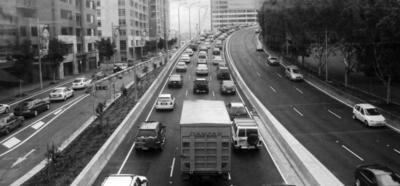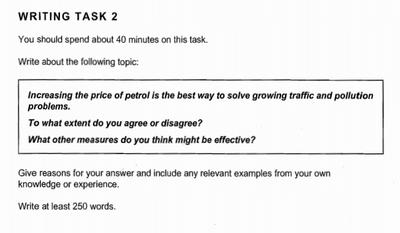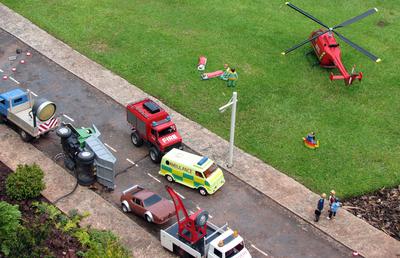Traffic and Transport Essays
by DIVYA RAJKUMAR
(DUBAI,UAE)
Increasing the price of petrol is the best way to solve growing traffic and pollution problems.To what extent do you agree or disagree?What other measures do you think might be effective?
With surging population and urbanisation, the traffic congestion and air pollution have become pressing issues in the todays society. Most people believe that soaring petrol price is the best way to tackle these issues. Some people believe that hike in the petrol prices will reflect on the low economy residents. However, the car owners are the middle and high income people therefore still the congestion and air pollution persists. In my perspective, increasing petrol price is not only the best solution but also the other measures can be added up.
Firstly,the government can urge the citizens to use a electric car in lieu of petrol car. In addition,non motor vehicles such as bicycle would mitigate CO, CO2 emissions and global warming. Besides that the government can build SPECIAL lanes for bike riders and also government can adhere obligatory pollution levy or congestion charges. So, the money received can be leveraged to reform public transportation systems such as metro,trams etc.
Additionally,alternative to fossil fuels can be bio diesel obtained from vegetable oil or animal fat which are predominately used in USA . These bio diesels in turn reduces emissions. For instance,British train operating company have incorporated 80% petro-diesel and 20% bio-diesel. As a result,these naturally obtained oils could protect environment from green house emissions, bio degradation.
To sum up, Rising fuel prices is not the optimal approach to bring down the amount of traffic congestion and pollution issues. Alternatively,other rigorous methods can be adhered to tinker the current system. Despite this,it is the combined effort of the government and people to guard the environment by planting more trees which will moderate the air pollution.
Comments for Traffic and Transport Essays
|
||
|
||
|
||
|
||
|
||
|
||
Raising Petrol Prices
by Elshan Salayev
(Baku, Azerbaijan)
Hi, everyone! Can anyone provide some feedback on my essay? I am particularly interested to hear what you think of the task achievement grade. Thank you in advance! The task is below.
Increasing the price of petrol is the best way to solve growing traffic and pollution problems.
To what extend do you agree or disagree?
What other measures do you think might be effective?
Today most of the modern cities are associated with traffic obstacles and environmental issues. I firmly believe that higher prices of petrol will enable us to eliminate these imperfections, while other methods should be employed wisely as well.
First of all, I reckon that problems related to the movement of cars through roads can be fixed by charging large sums of money from car owners. On condition that petrol becomes more expensive, the number of people who find using a car affordable will decrease. As a consequence, more individuals will rely on public transport. Besides this, governments have to require all drivers of private cars to pay a lot for the parking places they use. As far as I am concerned, some car owners tend to leave their vehicles near their apartments free of charge in Baku, which makes exploitation of cars extremely affordable. Also, more places should be redesigned for pedestrians, which includes preventing cars from accessing central areas of the cities.
Secondly, increased petrol prices will have positive effects on the environment. Most importantly, since the number of people preferring public transport and walking to driving will surge due to the increased petrol prices, the number of fumes will become reduced considerably. Currently, it is commonly believed by many scholars that Co2 produced by ordinary engines of cars deteriorates air in the cities. In addition, a gargantuan amount of waste is created by people. I firmly believe that megapolises, such as Moscow and Baku, must have recycling facilities that will prevent citizens from of these cities to dispose of their rubbish. I am convinced that some materials (plastic, paper, clothes and others) will be used in a more sustainable way because of recycling.
All in all, I consider that increased prices on petrol will lead to a decreased quantity of cars in modern cities, which will positively affect the environment and proliferation of public transport. Moreover, all cities must be equipped with recycling facilities, and car owners must pay a lot for their parking places.
Comments for Raising Petrol Prices
|
||
|
||
|
||
Reducing Traffic and Pollution
by Drape
(Italy)
Over recent years, some people have claimed that an increase in the price of petrol could solve both traffic and pollution issues. Even though I believe that this idea can help preventing the use of cars to some extent, more effective and efficient options should be considered.
To begin, it’s considered truth that a raise of the prices of some goods can lead to a decrease of the number of buyers, thus it would make sense to solve pollution and traffic related problems with a higher price of petrol. On the other hand, some people may be attached so much to the benefits provided by their vehicle that they decide to not change it. For example it could be preferable to go to work by car instead of train because it’s more comfortable, quicker and overall better even if it costs more.
Nevertheless, a solution to the problem still exists. In fact, it is accepted that, in order to reduce pollution, we should start using eco-friendly sources of energy, such as hydrogen and electricity. In the short term, the consumers may see only more costs due to the switch of technology, however I am convinced that in the long term these would be surpassed by the benefits. In fact, non-petrol sources of energy will cost much less in the future. Moreover, this statement is true also today if we compare the features of some cars.
All in all, I believe that, in order to solve the environmental issues we have today due to traffic and pollution, we ought to shift the focus from increasing the price of petrol to the research of alternative technologies. In fact, as far as I am concerned the total substitution of petrol is by far the most efficient and effective solution to the problem.
Please check and grade
Comments for Reducing Traffic and Pollution
|
||
|
||
Private Transport Systems and Safety
by Mahima
(Kathmandu, Nepal)
In some countries privately owned transport systems have a poor safety record. Yet it is the governments who have ultimate responsibility for public safety.
How can governments ensure that private transport companies do not neglect safety regulations?
With rapid globalization the economic status of an individual has upgraded encouraging people to own a private vehicle which is believed to have poor safety record. In the context of overpopulated city such as kathmandu, it has been a cause of threat for a safety of general public.
Firstly, the large numbers of private vehicle on the street of Kathmandu has been a major problem resulting in traffic congestion. People are not able to reach their destination at time. Even the ambulance carrying serious patient is not able to reach hospital in time. Secondly, negligence among the private vehicle owner such as not following the traffic rules, drinking and driving, competitions among the youngster to overtake the other vehicle has been a main reason of accident. Even the person who follows the traffic rule and crosses the road using zebra crossing has been the victim of road traffic accident.
The rules and regulation implemented by the government is so weak that the culprit can easily escape the accident case after paying some amount even the victim dies. Since the government is responsible for the public safety, serious step should be taken so that nobody neglects the safety regulations. It should ensure that each and every members of the city using the road follows the traffic rule, with severe punishment and heavy penalty provision to those who breaks it or causes road traffic accident. In addition, the government should also limit buying and selling of the vehicle to decrease the number of vehicle in the road. The distribution of the license should also be controlled by increasing the age requirement so that the youngster does not get involved in road traffic accident.
In conclusion, government is responsible for public safety which can be ensured by strengthening the traffic rules with punishment for negligence.
please check my essay and suggest how to improve it
Comments for Private Transport Systems and Safety
|
||
|
||
|
||
|
||
Improving Road Safety
by vijay
(alappey)
The only way to improve the safety on roads is to implement stricter punishment for driving offences?
Do you agree or disagree? What is your opinion?
There are many factors which influence the safety on roads, even in the recent years roads are becoming unsafe places for people. In fact, a driving offence is one of the reasons for unsafe roads, but implementing stringent punishment alone would not enhance safety on roads.
To begin with, better road conditions would have a great impact on road safety. This would mean certain road conditions like potholes, narrow and curved roads would cause serious problems even to disciplined drivers who would lose control over the vehicle, which may lead to road accidents. In such cases, stricter punishment is an illogical idea to implement.
Moreover, optimal traffic control systems have an ideal role in maintaining safety on roads. To be clear, adequate numbers of traffic signals, signboards and police officers would have significant effects on road safety, where they guide and control the vehicle by basic traffic rules. Therefore, the chance for even rash drivers to commit accidents is unlikely. To cite an example, studies point out that countries which have proper control systems have great controls over breach driving. So, the idea of imposing of tough punishments for reckless drivers on roads safety has futile benefits.
To conclude, from the global perspective, stricter punishments alone would not assure the safety on roads. In my opinion, rather than finding punishments for the problem, it is better to cut down the reasons for unsafe roads. Better road conditions and proper traffic control systems would ensure the safety on roads.
Please comment below on this Essay on Improving Road Safety in order to help the IELTS candidate improve their score.
Measures to Control Traffic Pollution
by Edgars
(Basel, Switzerland)
Hey everyone, here's my essay on petrol prices and pollution. I would like to have a feedback on grammar and structure.
Increasing the price for petrol is the best way to solve growing traffic and pollution problems.
To what extent do you agree or disagree?
What measures do you think might be effective?
Rising number of cars and consumption of fossil fuel gives rise on air pollution, whereas one of the solution could be higher prices for petrol. I agree that increase in petrol price will imply to mitigate those problems. Another leverage could also be implementation of progressive tax for motorcars.
First, it is obvious that traffic problems and air pollution arise from overcrowded streets and roads, in other words, increase of the amount of cars is higher that traffic infrastructure can withhold. Nowadays more and more people can afford to have a car and drive it daily. While fuel prices are relatively low individuals are not very concerned about congested roadways and, in my opinion, do not link it to rising air pollution. I agree that higher petrol prices will incentive drivers to reconsider the way they commute, and it is prospective that some portion of car owners will switch to environment friendly transports, for instance, public transport, bicycling or, nevertheless, walking, and lessen traffic jams.
Second, auto mobiles are note the only ones who convert fossil fuel to carbon dioxide and other air pollutants. Significant fraction of our everyday commodities are produced by petrochemical industry. As long as feed stock is cheap, petrol processing will thrive, whilst air quality will suffer. Therefore, a logical step will be increasing the price for petrol which would force the industry to research for greener manufacturing, for example, prefer biomass as a feed stock instead of fossil petrol.
In addition, if the general trend for solving both problems is to minimise the number of cars on the streets, then taxing car owners could be another effective measure. I suggest to implement progressive car exhaust tax, that would vary according to carbon footprint of the car. Furthermore, all incomes of the new tax have to be spent on infrastructure development of public transport. I think, that would clearly imply to drivers for prospective actions.
To conclude, I strongly believe that higher petrol prices will minimise traffic and pollution problems at some level, although more effective measures, for example, targeted taxing, would be needed to make a significant improvement.
Comments for Measures to Control Traffic Pollution
|
||
|
||
Essay on Traffic Problems
by Fyo
(Russia)
Could you please check my essay on traffic problems? 😊
It's my first text I am making to get ready for the IELTS test.
I am going to leave it the way it is. I've spent 25 minutes to write it and +3 minutes for a quick check. My aim was to see how well I can write in the shortest period of time possible.
The number of words is 362. (Yeah. I checked the amount of words after I finished writing, so now I know it's not that hard to write 250 words on a topic. Next time I'll try not to write that much)
In order to solve traffic problems, governments should tax private car owners heavily and use the money to improve public transportation.
What are the advantages and disadvantages of such a solution?
Over the last few years, the number of car owners rapidly increased. It led to a rise of traffic problems, such as traffic jams, violation of parking regulations and road accidents. In order to ameliorate the situation, the government and the authorities are discussing the introduction of taxes for private car owners. They say the money paid by the drivers could be used to improve the transport situation. Is it really a solution for the issue?
On the one hand, introducing extra taxes for drivers sounds like a good idea. The money could be used to repair the roads which are in poor condition at the moment. But on the other hand, repairing the roads will not make them wider. The actual problem is that streets and avenues in the center of the city were constructed without the anticipation of such an increase of number of vehicles on the city roads, in other worlds, the problem is not only in their condition, but in their width, which cannot be changed. In this case, the only solution would be building new bypass roads, so people who need to get from one part of the city to another could avoid having to drive through the historical center with its narrow streets and avenues. However, it would not solve the problem completely, as most of the people in our city work in the center, so traffic jams would be inevitable in the rush hours anyway.
On the other hand, if the government uses the money they get from the tax-payer drivers would be invested in improving the infrastructure of public transport, we could see fewer cars on the street. It is obvious that the main reason we use private cars is the lack of good public transportation. If the government increases the number of buses and makes the bus routes better planned, people could choose using public transport during their everyday life and use their private cars only for other trips, for example to get to the countryside or another towns.
To sum up, introducing the taxes might be a good idea, but the most important issue is to decide where to invest this money.
(362 words)
PS: I didn't read the essay on traffic problems posted here on the same topic before writing it.
I really recommend doing the same:
1) read the topic;
2) write an essay of your own
3) then read the essay of another author to compare your vocabulary, ideas and structure.
Electric Cars Essay
by Christina
(Kazakhstan, Almaty)
Some people think that only electric cars should be allowed on the road by 2040.
Do you agree or disagree?
There are a lot of discussions about if there should only be electric cars on the road in the future. Electric cars are one of the most innovative inventions that were done in the XXI century. Despite the fact that many people think there would be lots of positive aspects, In my view it also has enough drawbacks.
First reason why I disagree with this statement is the high price of electric cars. Electric cars are not only expensive by themselves, but also are rather complicated to maintain. Even if there would be analogs for Tesla, the most popular electrocar company, they require electrical charge, which surely costs more than simple gasoline cars. Moreover not every country in the world has electro-stations as it can be unprofitable and cost too much money. That means, it would be very hard to force people to refuse ordinary cars, and not every country would be able to afford it.
Second thing I need to say is that electromobiles have limited speedrun up to 500 kilometers for premium brands, hence the cheaper the automobile, the less time it can last. It can be changed in the future, but nowadays they are not efficient in terms of daily lasting.
On the other hand, electromobiles are obviously the best type of cars that can be offered in today's market for the environment. Although they require a lot of energy, it is generally better than gas and petrol that pollute the air with chemicals. Usage of electric automobiles can reduce carbon footprint. As well as that they can be charged with renewable energy and use things like solar power.
In conclusion, this statement has both advantages and disadvantages. However, I suppose, it will take too much maintenance to change the whole car industry, as electric cars still have their downfalls.
Reliance on Cars
by James
I am taking IELTS this coming Saturday and in need of comments for my essay writing. Please help!
More and more people are relying on the private car as their major means of transportation.
Describe some of the problems the reliance on cars can cause, and suggest at least one possible solution.
The increasing preference of using private vehicles as the means of transportation has caused an array of issues in many parts of the world. This essay will examine some potential impacts that this trend has on society and suggest some feasible solutions to ameliorate such backlash.
Predominantly, the rise of private vehicles has led to a number of issues which severely affect the quality of life of the people. To begin with, this trend is the root cause of traffic congestion in many metropolitan areas. More vehicles simply mean more traffic; road infrastructures are unable to keep up with such a sudden increase, thus lead to traffic jam. In addition, this malpractice is one of the contributing factors to pollution which affect us day by day. For example, the amount of burning fossil fuels significantly increase in order to fire up the engines of the millions vehicles. This translates that the severity of the pollution to the environment are gradually rising due to the amount of carbon dioxide being emitted to the atmosphere. Apart from this, noise pollution is also derived, though partially, from the increasing number of vehicles, and it tremendously degrades the quality of life people used to have before the advent of the development.
This, however, is not an impossible-to-solve issue if proper measures have been in place by the government and individuals. First of all, heavy tax can be introduced by the government in order to deter commuters from tempting to use their private means of transport, due to its high cost. At the same time, it also encourages people to start using public transportation. Individual people can also contribute to solving this matter. Carpooling, for example, is an effective solution to traffic congestion, and should well be adopted by many, so that, instead of one car for one person, a group of four or five and share if their destination is identical.
In conclusion, although increasing number of vehicles poses some serious issues to the society, it can still be easily resorted if everyone join hands and take some serious steps to solving it.
Comments for Reliance on Cars
|
||
|
||
|
||
Building Railways or Roads
by Inna
Governments should spend more money on railways rather than roads.
To what extent do you agree or disagree?
Since time immemorial, people try to find the most effective way for transferring goods as well as for travelling. Some of them prefer to use railways, another find more advantages by car driving. Whilst, I believe that there are strong arguments on both sides, I would suggest that it is more beneficial for national authorities to invest in railways building.
Nobody can deny that spending money on roads is more profitable for government. First, all materials, which are necessary for such building, are usually cheaper to purchase than, for example, to buy rails or trains. It also should be noticed that during next five or ten years authorities could spend less money on roads reconstruction or repair. Moreover, the speed of the roads building is the factor of utmost importance. Due to the spending less time for the road creation, government, for example, can efficiently deliver all necessity goods and help to the citizens who suffer from earthquake or storm.
Turning to the other side of the argument, railways continue to show their potential in developed countries. Modern trains, which are used only electricity, have a positive impact on our environment. Japan is the best example of how rational using of railways helps government to develop all areas of the country. New trains could be used by more than thousands people per hour, which allow workers to drive to their factories and offices at any part of the country. Despite the fact that the newest train’s speed is about 600 km per hour, Japanese railways are safety and very convenient.
To conclude, both railways and roads have advantages and disadvantages for counties. However, I strongly believe that if the governments have enough money they should invest in railways rather than in roads, because modern trains are more reliable and faster than cars or buses. In long term perspective national authorities will spend less on environment protection as well as on attracting labor in small cities.
Paying to Maintain Roads
by Anon
As the number of cars increases, more money has to be spent on road systems. Some people think the government should pay for this. Others, however, think that drivers should cover the costs.
Discuss both views and give your opinion.
Some today have argued that the funding for road systems should be the responsibility of governments instead of individuals. In my opinion, although maintaining roads can be considered a public service, private motorists should pay in order to more generally benefit society.
Proponents of governments assuming road costs argue this is a basic service tax-payers expect. In all countries, working adults must pay a certain percentage of their monthly salary to the government. From these contributions, individuals justly feel entitled to a variety of public services ranging from police and fire departments to affordable hospitals and safe infrastructure. Roads are a key component in this contract as most people drive in order to go to work, see friends, and take holidays. The government will itself benefit not only from fulfilling this mandate but also in terms of the financial byproduct of consumers being outside actively contributing to a market economy.
However, forcing drivers to pay these costs will greatly discourage private automobile ownership. This disincentive is crucial today because cities are overcrowded and private vehicles contribute to rising pollution levels. In large cities such as New York City and Tokyo, it is nearly impossible to traverse the city by automobile at peak rush hours. If there were fewer cars on the road, then people could travel more freely on bicycles, on foot, and using public transportation. Additionally, private vehicles are inefficient. Other forms of travel leave relatively small carbon footprints but cars, often carrying only one or two passengers, use more petrol than would normally be required to transport people. Replace cars with more efficient transport options and there would be a marked decrease in the consumption of fossil fuels.
In conclusion, despite the strong argument that tax-payers deserve public infrastructure such as roads, it is more important to discourage individuals from purchasing cars. In the long-term, this will greatly benefit cities and the world as a whole.
















